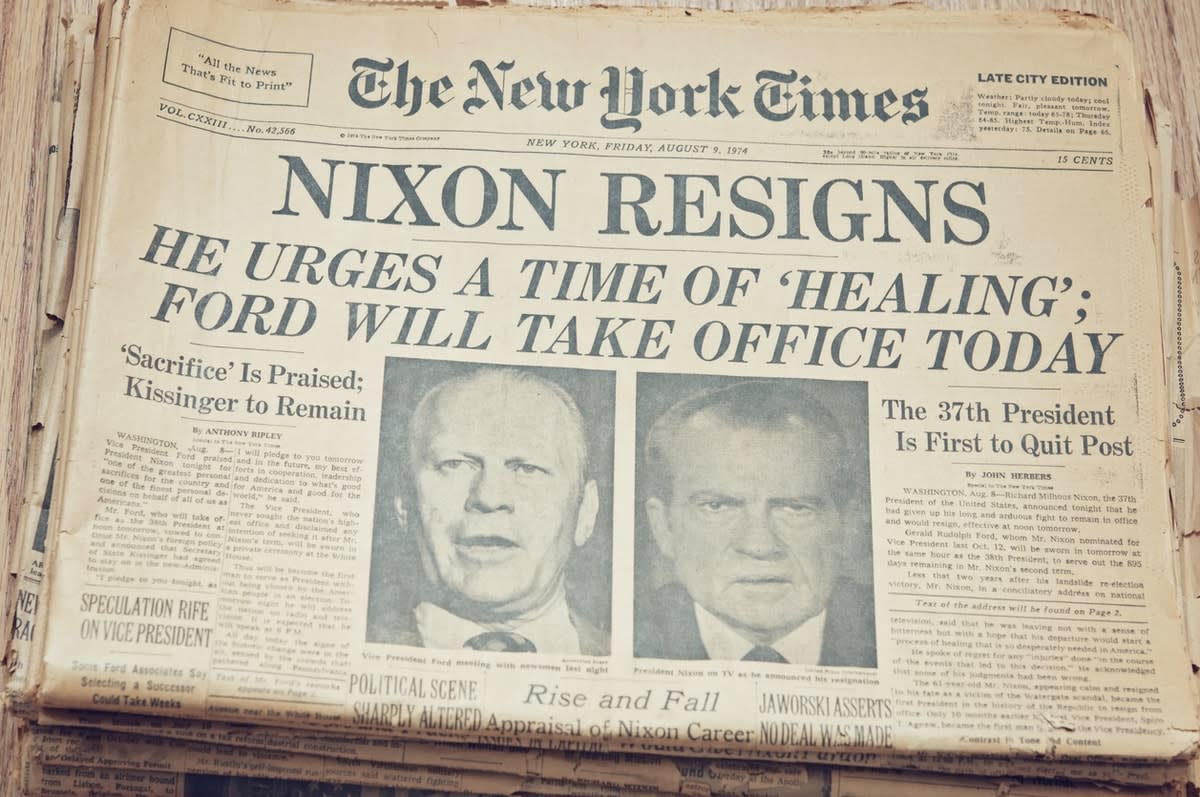
The Trump presidency is proving to be as tumultuous as many observers predicted it would be. The recent decision by the Democrats to open an inquiry to impeach Donald Trump is the latest chapter in a truly bizarre period of US politics.
The inquiry is the first step in a series of gambits that are required to fully impeach the sitting president. Trump has vowed not to cooperate. A constitutional crisis appears to be unfolding in Washington.
What is impeachment?
Let’s be clear. This is not about removing Trump from office. Not yet. There’s a process that must be played out. Impeachment is a legal process whereby the House of Representatives may impeach the President by vote. Prior to any such vote, an inquiry of impeachment is required. This determines if there’s sufficient concern, or indeed evidence, to draw up formal Articles of Impeachment. Congress then votes on whether or not to send the matter to trial and have the sitting president removed.
Should the vote pass, the trial is undertaken in the Senate. To force a president from office, a two-thirds Senate majority must find the president guilty.
At this point, with Trump, we’re in the inquiry stage. It’s important, especially with the rampant and confusing news coverage across all media platforms, to keep this in mind. Supporting this inquiry is a vastly different proposition to the House supporting the actual impeachment of President Trump.
Only three presidents have faced impeachment proceedings: Andrew Johnson (1868), Richard Nixon (1974) and Bill Clinton (1999). Each for very different reasons. Johnson was acquitted by a margin of one vote in the Senate and went on to serve out his term.
The Articles of Impeachment Clinton faced related to lying and false testimony as a result of his inappropriate relationship with White House intern Monica Lewinsky.
Clinton though, like Trump, faced a hostile Congress that had long been making noises about impeachment. However, the Senate numbers were insufficient for a guilty verdict. Clinton was popular, and “the Comeback Kid” successfully completed his second term.
Where Johnson, Nixon and Clinton’s impeachments were catalysed by domestic incidents, Trump has been caught out through a phone call with a foreign power.
Nixon resigned in disgrace before impeachment could get underway when he realised he would likely be removed from office as the evidence against him mounted.

What was the catalyst?
Trump’s approach to domestic and foreign policy has been ad hoc at best. It’s been a foreign policy misstep that has brought the start of the impeachment process to Trump in the Oval Office.
President Trump admitted he was withholding aid to the Ukraine in the days prior to allegations that he was putting pressure on the Ukrainian President to investigate Joe Biden. This is crucial, because it ties into the 2020 presidential election.
Biden, former vice-president under Obama, is likely to be the leading Democratic contender to run against Trump – and Trump has a history of going after Biden, whom he often refers to as “Sleepy Joe”.
While leading Democrat and Speaker of the House, Nancy Pelosi, has been resistant to impeachment proceedings in the past, it was Trump’s alleged transgression with Ukraine that compelled her to act.
Trump is accused of violating the Constitution of the United States, betraying his oath of office, and threatening the national security.
Where to next?
The inquiry to impeach Trump looks set to unleash a constitutional crisis. Trump, who’s shown little regard for any sort of process or procedure that doesn’t ingratiate him, is bent on obstructing and thwarting the inquiry.
Since he announced his intent to run in 2016, Trump has profited from creating division. He’s split the Republican party; it’s no longer the GOP of old. It’s been fundamentally changed by Trump after many bitter years of increasingly partisan politics during the Obama years. With the 2020 election a little over 12 months away, Trump is likely to escalate hostilities with his Democratic rivals and those Republicans who don’t stand with him.
Trump is a self-proclaimed winner. Nixon, too, even through his own impeachment, saw himself as a winner. Yet Nixon soon found himself without sufficient support in Congress. He resigned before a vote could be taken in the House to impeach him.

Trump, however, appears to see himself as being above the law. He’s instructed that the White House will under no circumstances cooperate with the inquiry process. To date his key advisors have refused to comply with subpoenas – among them, the Vice-President, the Secretary of State and the Ambassador to the European Union.
Others will surely follow in their steps. The calculus surrounding the process is only going to become more complicated. It will also feed the animosity between Trump and those who oppose him.
The political stakes are very high for Trump and, more broadly, the United States. Can he maintain his support, or will it desert him? Will the Democrats find the smoking gun they need to undermine Trump? What will this mean for the 2020 presidential election?
One thing is certain – the US domestic political environment is set to become more charged. Trump and his supporters will use the impeachment process as a weapon. They’ll argue that it’s further evidence that their Democratic opponents and the Washington establishment are crooked.
Trump and his supporters will use the impeachment process as a weapon. They’ll argue that it’s further evidence that their Democratic opponents and the Washington establishment are crooked.
Conversely, the inquiry will only serve to motivate his opponents. The Democrats smell blood in the water, but they, too, have a lot at stake. Namely, the chance for a Democrat to win the 2020 election.
It’s also likely that many Americans will simply be fed up with the politics and not bother voting at all.
There’s a long way for the impeachment process to run. Trump’s presidency has been the most divisive since Nixon came to power in 1968. There’s every reason to believe it will tear the fabric of US politics as much as Nixon’s impeachment did. The 2020 presidential election will be a strong initial indicator of the damage done.
There are two real outcomes. Trump might well emerge victorious and feel more emboldened to pursue his slippery political agenda. Or, he’ll go down in flames, taking as much as he can with him.
Either way, it’ll take a great deal to restore faith in the integrity of the institutions and political processes of the United States.





